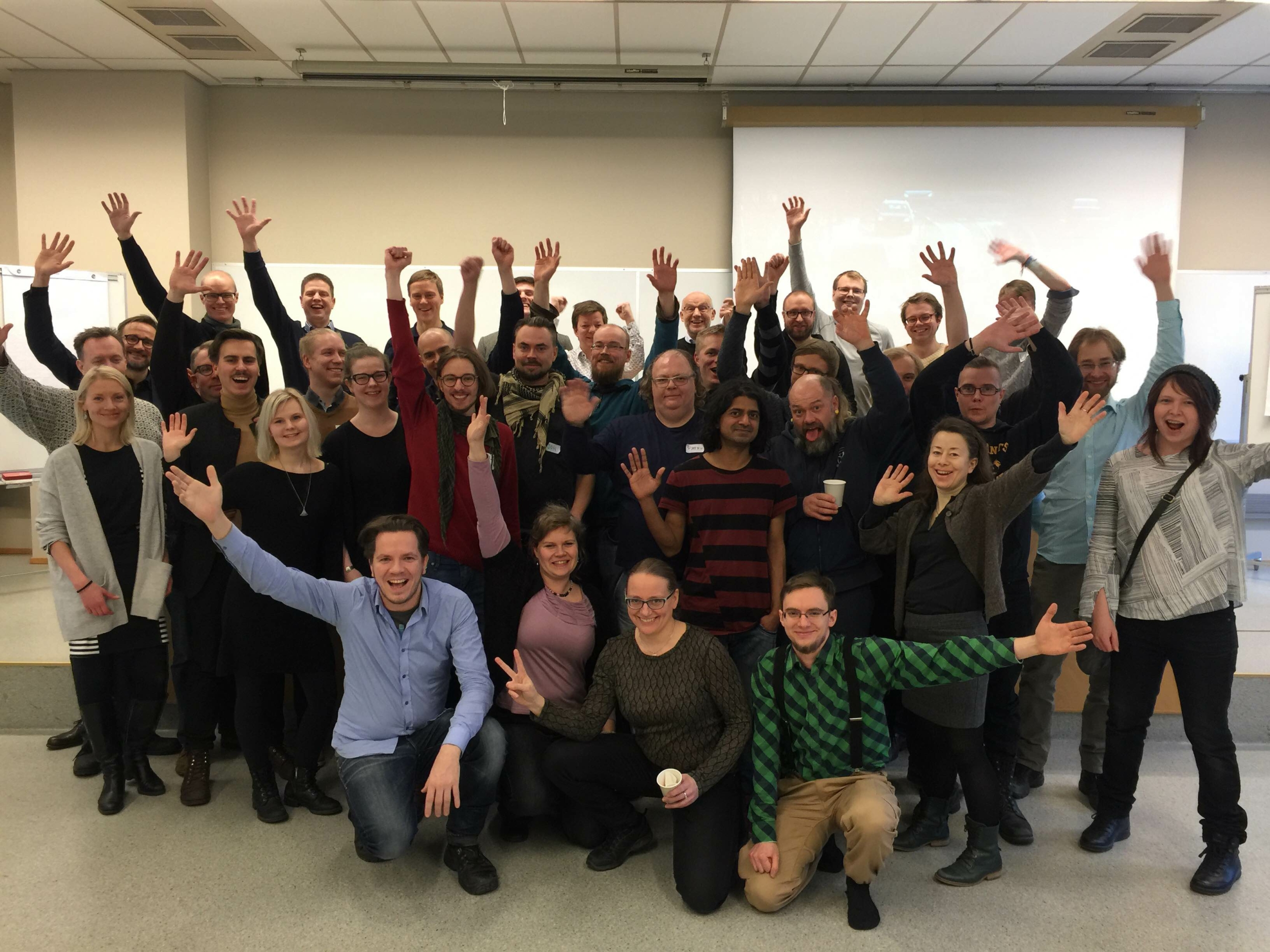What do researchers, socially active people, young politicians, computer programmers and activists have in common? The answer: a passion for contributing to the basic-income experiment.
Our bus was crammed with ideas, inquisitive minds and, naturally, Post-It stickers in various colours when we set out for Finland’s first Basic Income Hack, held on 4 March 2016 in Vuosaari, Helsinki.
Ten teams, 40 participants and a handful of organisers worked for 32 hours on finding new perspectives on basic income and solving the associated problems. This two-day session generated a dozen or so interesting ideas, the best of which, The cost-of-living bonus – a solution to the problems associated with housing allowance (Perustulon elikustannuslisä) and Basic income game – a simulator for illustrating the impact of life choices on the public economy (Perustulopeli) were rewarded at a final session arranged at Sitra on 8 March 2016.
Basic income arouses passions
As part of the current Government Programme, the basic-income experiment has been one of the political hot potatoes of late 2015 and early 2016. The fragmentation of work on the one hand and the bureaucratic traps associated with social benefits on the other have spurred the discussion on – and brought us a step closer to – a basic-income experiment.
If welfare is complex, so too are the preparations for a basic-income experiment. The question of the amount paid, the type of experiment conducted and the recipients’ obligations have kept the discussion lively. This situation is not helped by the fact that no proper basic-income experiments have ever been conducted before. Instead, the concept is being widely discussed around the world, perhaps more than ever.
“Because this is a crucial experiment which could entail a massive change in Finnish society, it is critical that we listen to those affected by the change – the people,” says Vesa-Matti Lahti from Sitra.
Of the more than 60 people who registered for this developer event, 40 – in 10 teams – were selected in advance. Each had their own perspective on basic income. While some were interested in incentive traps, others focused on cutting through red tape, while a third group sought facts and knowledge based on a burning desire to contribute to a major social policy reform.
Some ideas addressed problems related to the basic-income experiment, such as Selective sampling for the basic-income experiment (Valikoiva otanta perustulokokeiluun), and The cost-of-living bonus – a solution to the problems associated with housing allowance (Perustulon elinkustannuslisä – ratkaisu asumistuen ongelmiin). Other participants sought ways of combining the Nordic welfare state with the concept of a basic income. These ideas included A progressive negative income tax (Progressiivisen negatiivinen tulovero) and Basic income in the Nordic welfare society (Perustulo pohjoismaisessa hyvinvointivaltiossa). The basic income game (Perustulopeli) and The basic-income calculator (Perustulolaskuri) sought to illustrate both the costs associated with a basic income and its effect on life choices in terms of influencing behaviour. Another focus was the communications aspect, with the teams Congratulations! and Scenario Building (Moodhack) emphasising the importance of visualisation and clear language when communicating on the basic-income experiment. The Good Village (Hyvä kylä) and Guarantee Network (Takuuverkko) teams put their faith in individuals – they viewed basic income as involving a bonfire of red tape, with carrot-and-stick-based bureaucracy replaced by trust-based collaboration.
The following ideas were proposed at the Basic Income Hack
Valikoiva otanta perustulokokeiluun (Selective sampling in the basic-income experiment). This team sought to enrich the results of the basic-income experiment by combining them with existing research on social and welfare services. As its name suggests, the team proposed that basic income be applied to a number of special groups chosen through selective sampling.
Perustulon elinkustannuslisä – ratkaisu asumistuen ongelmiin (The cost-of-living bonus – a solution to the problems associated with housing allowance). This team sought a solution to problems associated with housing allowance, such as incentive traps and continuous rent rises. The idea was to identify a social welfare model that would retain the benefits of the basic income while eliminating problems associated with housing allowance.
A team known as Takuuverkko (The guarantee network) also focused on poverty traps. It sought a basic-income model that would guarantee a sufficient income level for people all over Finland, while stimulating activity and creating added value throughout society.
Hyväkylä (Good Village) was an experiment in activating people and communities to shift from a money-centred basic-income concept towards a community-based approach. Community and trust took centre stage in this experiment.
The Moodhack – Basic Income group aimed at a visual model that would present various scenarios on how a basic income would lead to behavioural changes in people, organisations and society.
Onneksi olkoon, sinut on valittu! (Congratulations! You have been chosen!). This team focused on the communicative aspects of the basic-income experiment. It envisaged a citizen-centred information pack on the impacts and opportunities of the basic income at various stages of life. The information pack was to be posted to the people selected to participate in the basic-income experiment.
Taantuvasti progressiivinen veromalli (The regressively progressive taxation model) is a completely new basic-income model. The team in question developed a mathematical function which provides a simple way of combing income tax with welfare. This model can also be regarded as an application of the reverse income tax, but with a strong mathematical basis. It seeks to combine the progressive income tax typical of the Nordic countries with a welfare system that incentivises people.
Perustulolaskuri – Miten perustuloa vaikuttaa sinuun? (The basic income calculator – how will the basic income affect you?). Understanding the concept of a basic income is difficult. The basic-income calculator provides citizens with an easy-to-use tool for comparing their current income with the one they would receive under the basic-income experiment. This team created a visual simulator which allows gamers to assign a value to the choices made by various groups on their earnings and use of time, and presents the resulting financial effects.
Perustulopelissä (The basic-income game) simulated the impact that people’s life choices had on the public economy, in order to encourage participants – in a simple way – to make personal life choices.
Omat Palvelut – palvelupoluista palvelumaisemaan (My Services – from service paths to a service landscape). The basic income has been criticised for leaving people to their own devices and failing to provide sufficient incentives. The Yleisturva (general protection) model rewards people by providing them with increased benefits. This model, with its acclaimed link to services, is created using the profiling and self-assessment feature of the Omat Palvelut (My Services) application.
All of the above ideas can be found on the website of the hackathon here (in Finnish).
Whether or not some of the ideas will find its way in the proposals of the Kela-led consortium (Kela – Social Insurance Institution of Finland), one thing is for sure: Finland has taken a step closer to a genuine experimental culture. It is also great to see how many people were willing to devote most of their weekend to an important social experiment. As one of the journalists put it: it is wonderful that 40 people were willing just to help Kela. This is surely positive news.
The Basic Income Hack was arranged by Demos Helsinki and Open Knowledge Finland as part of a Kela-led survey on the basic income. The Basic Income Hack was based on the hackathon method, which is used for problem-solving by professionals such as computer programmers and is increasingly being applied to societal problem-solving and the testing of ideas. A hackathon is not a seminar, meeting or conference. It is closer to a brainstorming session involving the cross-pollination of ideas.




Recommended